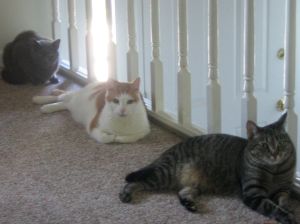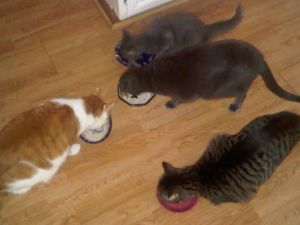I have moved!
Posted: October 26, 2011 Filed under: Uncategorized | Tags: Chronicle Leave a commentIt’s official – I am now blogging in my new space on the Chronicle. Come join me!
Away message
Posted: October 6, 2011 Filed under: Uncategorized | Tags: Travel 1 CommentWow, you guys. That was intense… In case you missed the madness, my last post was featured on WordPress Freshly Pressed the other day, which brought over 3000 visitors. Holy crap!
 So: Welcome, new readers! I hope you will enjoy what you find here. But right now, I’m off to Europe on vacation for a week!! My default comment setting is that new commenters go into the moderation queue, so if you comment for the first time over the next week, it’ll be a few days before your comment gets approved. Don’t worry, I’m not ignoring you!
So: Welcome, new readers! I hope you will enjoy what you find here. But right now, I’m off to Europe on vacation for a week!! My default comment setting is that new commenters go into the moderation queue, so if you comment for the first time over the next week, it’ll be a few days before your comment gets approved. Don’t worry, I’m not ignoring you!
I’ll be back in a week. Perhaps I’ll post some pictures. But now I must finish packing.
Fauxductivity
Posted: October 4, 2011 Filed under: Uncategorized | Tags: productivity 105 CommentsIn the Chronicle yesterday, there was a nice piece about “procrastination productivity” that several of my friends posted to Facebook – about all the things you get done because they are a distraction from the real things you have to get done, and while they make you look like you are being productive, you know the truth.
 I am very familiar with that tactic, but I have another one that’s even worse. Fake productivity, or “fauxductivity” as I like to think of it, is where you surround yourself with accoutrements of productivity and busyness so not only does it look like you are busy and important but you are hoping to trick your brain into acknowledging the need to get work done and then spend extra time doing it.
I am very familiar with that tactic, but I have another one that’s even worse. Fake productivity, or “fauxductivity” as I like to think of it, is where you surround yourself with accoutrements of productivity and busyness so not only does it look like you are busy and important but you are hoping to trick your brain into acknowledging the need to get work done and then spend extra time doing it.
I am in a very importantly busy stage at work right now, and I have given in to my favorite fauxductivity trick (well, it’s less of a trick and more of an affectation): I start carrying around folders full of manuscripts, etc. at all times. Most of my purses are large enough to hold file folders for just this purpose. I take my work home with me, to the grocery store with me, to the doctors’ office, wherever I go. Because you never know when an unexpected burst of productivity might strike, and you have to be prepared!
Not once has this little trick actually resulted in getting any real work done… but hey, you never know.
Deluxe apartment in the sky
Posted: September 28, 2011 Filed under: Uncategorized | Tags: Chronicle, new name 1 CommentHey you guys! Guess what, guess what! I’m moving to the Chronicle Blog Network!
I know, I know. You hate it when people do that. You think it’s inconvenient to get a new login in order to comment, you don’t like the new location, and for some reason you think bloggers are less genuine or something when they’re hosted by a big network. I get it, I do. But I like the Chronicle, and I think it’s important that non-traditional academic types like myself are represented in these forums. I’m incredibly pleased to have been invited to do just that.
If you read this blog through an RSS reader, all you have to do is update the feed address and nothing will change. They will never put the blogs behind a subscription wall, and they have no editorial control over what I write. Plus they’re designing a snappy logo for me.
I have decided that it’s best for me to maintain my pseudonymity over there. The Chronicle is very supportive of pseudonymity, and in fact they only know my first name. I thought about going public – it would be so much easier to talk about how to run a Center if I could actually talk about how I run a Center. But I tried to imagine having “the” conversation with the Center PIs about blogging… and I just couldn’t do it. They get paranoid enough about being careful on our Center’s blog. I’d much rather self-censor than be censored by my employers.
Then I realized that I don’t really have a pseudonym in this space. “Research Centered” is the name of this blog, not the name of a blogger. It doesn’t really convey a personality.
So I would like to introduce myself to you as Minerva Cheevy.
Minerva is, of course, the Roman goddess known by the Greeks as Athena, goddess of wisdom and war — two things in which someone in a position like mine must be skilled.
It is also a feminization of the name of the rather useless hero of the Edward Arlington Robinson poem. Miniver Cheevy was “a child of scorn” who had romantic notions about the past, and was absolutely sure that his life would have been awesome had he been born in a different time. He was very unhappy about his actual place in life, but refused to do anything about it. Instead, he sat around complaining and drinking. I certainly do my share of scorning. And thinking. (And drinking.) But I hope the resemblance ends there – and I’d like to use the name as a constant reminder to myself of what I don’t want to become.
The move won’t happen for a couple more weeks. When it does, there will be a redirect here at this address. I hope you’ll follow me over there, and consider getting yourself a Disqus login so you can comment.
Advanced faculty wrangling techniques
Posted: September 23, 2011 Filed under: Uncategorized | Tags: cats, emails, faculty, frustration, meetings 39 CommentsGetting a group of faculty members together to accomplish something has often been compared to herding cats. I disagree. When I want to get my cats all into one room to do something at the same time, all I have to do is stand in my kitchen, open a can of Friskies, and yell “Num nums!”
Not so with faculty. If you have, say, 20 professor cats, and you would like them all to arrive in the same place at the same time, you can’t just send out a general email to all 20 of them that says “Num nums will be served in the kitchen at 6 pm.” Most professor cats will just delete that email, if they see it at all. Only 2 or 3 professor cats will show up – the ones with the most interest in num nums and the most criticisms to offer. They will spend the whole time coming up with ways to improve the num num experience, and at the end of dinner time they will have come to an agreement that next time, instead of opening a can of shredded salmon flavored cat food, you go out, catch a fresh salmon, clean it and gut it, and serve the fresh raw filets on ice. And at least three of the no-shows will complain that num nums were served without them, why didn’t anyone tell them there would be num nums.
The lack of response is especially confusing because the professor cats are the ones that suggested the num nums in the first place. They like num nums. They wrote the grants that got the funding for the num nums. And you already polled them and picked a num num eating time that worked for everyone.
So next, time, you decide to make it more personal. Instead of a mass email, you send individual handwritten invitations to each professor cat, that read something like this: “Dear Dr. Kitty: As per the schedule that is clearly posted on the kitchen website, num nums will be served tomorrow in the kitchen at 6 pm. I have made sure that both tuna and chicken flavors will be present, as you suggested last time. I hope to see you there.”
This time the results will be a little better. Maybe half of the professor cats will show up in the kitchen within 30 minutes of the announced time. But others will delegate the num nums, and you will receive several emails from grad student and postdoc cats asking questions about the purpose of the num nums and whether there will be turkey flavor. A couple of other professor cats will call your office phone at 6:05 pm – despite the fact that you have made it known that you will be in the kitchen, not your office, at 6:00 pm – asking where the kitchen is and how to get there.
Afterwards, you will have some leftover num nums that absolutely must be fed to all of the professor cats who were not in attendance, even if you have to feed them a couple of days after the deadline. So you individually email each of the professor cats who didn’t show up: “Dear Dr. Kitty, We served num nums yesterday at 6 pm, and you were not present to eat your num nums. Please come to my office by 5 pm today in order to eat your num nums.”
At least two will respond with, “Sorry, I didn’t realize the num nums were for me.”
Now you start getting smarter. You realize that the only way to get all the professor cats to eat all their num nums is to make it a requirement in order to receive funding for future num nums. You develop a complicated – but user friendly – online tracking system so that you will have data on which professor cats ate their num nums and which did not. Now you will have to send even more emails and meetings with instructions on: when and where num nums are served (even though it is in the same place every day and has been in the same place every day for the last 5 years), how to report one’s consumption of the num nums, the requirements for eating num nums, and the consequences of not cleaning your plate.
Some professor cats will complain that you send too many emails. Other professor cats will complain that you don’t send enough emails.
You will still never get more than 75% of the professor cats in the kitchen at the appointed time, and you will spend a large chunk of your day fielding complaints about the online tracking system and answering questions that never would be asked if the professor cats had simply read the 6 emails carefully explaining the process, or went to the kitchen website and clicked the tab marked “Daily Num Num Schedule.”
No matter what you do, you will still have to run down the street after wayward fluffy tails, waving a can of num nums and feeling like an idiot.
Email autoreplies
Posted: September 16, 2011 Filed under: Uncategorized | Tags: emails, frustration 3 CommentsI understand and accept the usefulness of email “away” messages. But I must admit it drives me crazy when someone emails me, and I hit “reply” and send a prompt response, only to get their “away” message in return.
Especially when the away message says “I will return on September 9 and respond to your email as soon as possible”… and it’s September 15.
A full life
Posted: September 9, 2011 Filed under: Uncategorized | Tags: derby, real life 2 CommentsIn grad school and later, I often heard people say that it was important to have a well-rounded life and interests outside of academe. My response to such statements, which I usually kept to myself, was that I could have a well-rounded life after I got a job. And really, what did I need a well-rounded life for anyway? I was already doing what I loved, right?
Well. At some point during my postdoc, my career really did stop being “enough” for me. I had stopped wanting to do (or being mentally capable of doing) work at all hours of the day and all days of the week, which sometimes left me with empty evening hours, unsure of what to do with myself before bedtime. But I was still stressed out about and focused on getting a tenure track job, so I guess I tended to fill those hours with worrying and obsessively searching the job listings.
Anyway, I’ve been in my happy new job for over a year now, and the Spouse (who also has a PhD and also does not have or want a tenure track job) and I have decided that it is finally time to Do Other Things. We go to the gym now, we buy tickets to concerts, we travel. But more importantly, we have decided that it is finally time to pursue things that we’ve wanted to do for a long time. Spouse started piano lessons earlier this week, and he is super excited.
 And what am I doing? Well, I am finally committing to doing something that excites and scares me. I have been a roller derby fan for years. We always go to the games, and Spouse and others are always elbowing me saying, “you should do that!” And sure, I’d like to, but I feel like I’m getting too old to fall down that much, and I’m not sure I can commit to that many practices a week. But I do like to roller skate, and I’m awfully good at telling people what to do, so I got in touch with the appropriate people and I am going to train to be a roller derby referee. Yay! And yes, the refs do skate and they do have fun cool names too. Nearly all the refs I’ve ever seen are men, which gives me another good reason to do that instead of trying out for the team. So, step one was talking to the right people, and step two was buying all the gear. I am now the proud owner of derby skates, pads, and helmet. Maybe this weekend I’ll finally try them on.
And what am I doing? Well, I am finally committing to doing something that excites and scares me. I have been a roller derby fan for years. We always go to the games, and Spouse and others are always elbowing me saying, “you should do that!” And sure, I’d like to, but I feel like I’m getting too old to fall down that much, and I’m not sure I can commit to that many practices a week. But I do like to roller skate, and I’m awfully good at telling people what to do, so I got in touch with the appropriate people and I am going to train to be a roller derby referee. Yay! And yes, the refs do skate and they do have fun cool names too. Nearly all the refs I’ve ever seen are men, which gives me another good reason to do that instead of trying out for the team. So, step one was talking to the right people, and step two was buying all the gear. I am now the proud owner of derby skates, pads, and helmet. Maybe this weekend I’ll finally try them on.
Anyway, the point is that it is fun and surprisingly liberating to try new things. I’m not talking about trying something once, I’m talking about committing to something that will require a lot of time and effort. It’s liberating because my life and career doesn’t depend on it – I don’t have to think, “Do I want to spend the rest of my life doing this?” It doesn’t matter. I can change my mind at any time. What a crazy thought.
Extensions
Posted: August 30, 2011 Filed under: Uncategorized | Tags: publication, research 5 CommentsSo, my horrible paper that I have submitted to four journals finally got a revise and resubmit this time, hooray! The trouble is, it is a very big revision that they have requested. Fine, fine, I’ll do it, even though it is extremely painful.
The journal has given me two months to revise and resubmit, and I spent most of that first month traveling and attending or running conferences. Now I’ve got just under one month and I’m not confident in my ability to do all that work in that short period of time. I did get started on it a week ago but, well, it’s a lot of work.
So I’m considering asking for an extension for the first time in my life. Anybody have any experience doing that? Should I ask now? Or would it be better to wait until closer to the deadline? Will they give me an extension, or should I just work harder to try to make the deadline?
Not ashamed
Posted: August 9, 2011 Filed under: Uncategorized | Tags: alt-ac musings, respect 3 CommentsOn Friday night, I was at restaurant with a group of friends, and as it turned out, three of us (me and two other female Ph.D.s) were all in non-traditional academic jobs — and we all love our jobs. All three of us are in center-related positions with administrative and research responsibilities, and we are pretty happy. One expressed a wish that she had more time for independent research, but that is not an uncommon sentiment even in traditional academic jobs.
I thought of the our conversation when I read this piece in Inside Higher Ed:
When we were interviewing contributors for the first edition of Job Search in Academe, an editor at a respected academic journal told us apologetically that she “liked her job, she really did!” Many of the pleasures of teaching, she told us, were central to her job on the “outside”: working with writers, playing with words and layouts, engaging in meaningful conversations, working a varied schedule. The tragedy is that she felt she had to convince us of that.
Why do those of us in non-traditional academic jobs feel the need to convince others that we like our jobs, we really do? I’ll tell you why – because of the pitying looks we get from other academics when they hear what we are doing. I think these pitying looks come from two groups of people in particular.
The first group is tenure-track/tenured professors who believe that any other path is inferior, and that those of us not on that path must not have what it takes to succeed. These people are snotty elitists and there’s not much we can do about them. I don’t waste my time worrying about these people.
The group that has bothered me more in the past are the deluded grad students and post-docs who believe that 1) any other path is inferior (see above), 2) any one who takes a job off the tenure-track is “giving up,” and 3) of course they’ll succeed, their experience will be different. These are the same people who give you pitying looks if you take a tenure-track position at any institution that is not an R1 or a prestigious private SLAC.
I’ve decided not to let this group bother me any more either. They’ll learn about the real world soon enough.
And at a conference a couple of weeks ago, I felt like a shift was occurring in the academic zeitgeist. When I met new people and told them about my job, they genuinely seemed to think it sounded like a great job. Some even seemed envious. Of course, by being there and presenting results from this summer’s fieldwork, I was able to demonstrate that one could be an active researcher in a position like this, which might have helped a bit.
I don’t know if I am noticing them more or what, but it seems to me that non-traditional academic positions are becoming more common. Another friend of mine just got a position running the educational/outreach programs at a research station, which I think is a great job for her. But when she got the job offer, a whole bunch of people did the equivalent of coughing and looking away. I was one of the few to encourage her to take the job and to enjoy it. And so far she’s glad she did – especially since her other option was adjuncting in a big city and keeping her fingers crossed that one day, one of those universities in that city just might offer her a permanent position.
I don’t think of my job as “second-best,” and neither should the rest of us in so-called “alternate” careers. I get to do everything I love about academia – and I avoid many of the things I hate about it. I’d say that’s a pretty good deal.
I’m back!
Posted: August 5, 2011 Filed under: Uncategorized | Tags: productivity, publication, research 1 CommentMy Epic Summer of Epicness (and Epic Exhaustion) is pretty much over now – and not a moment too soon. I am tired, people. I spent a month in the field, which was great and all, but tiring, then drove back across the country, went to work for four days, then flew to another place for a friend’s wedding, came home for less than 24 hours – 4 of which I spent at work – and then drove five hours away for a big conference. All of this was wonderful and time well spent, but there wasn’t much time for sleep in there.
Now my life is somewhat normal again, although still very busy. Next week is our center’s annual conference, so it’s a bit crazy around here as we try to get it all organized.
Some updates on my productivity:
- of the three papers that were in review already, one was accepted (which I already wrote about), one was favorably reviewed but rejected as not being right for the journal, and the last one – the paper that won’t die, the one that has been to four journals – finally got a revise and resubmit!! Hooray! A whole lot of major revisioning has been requested but this is huge progress compared to the last three years.
- I am currently working on a review paper with a friend of mine who works on the same topic as me. Pretty happy about that.
- I presented preliminary results from this summer’s fieldwork last week at the conference, in which I tested what may sound to some like a really crazy idea, but it was very well received. Several people said to me that they had noticed this phenomenon too and wondered if it was what I thought it was. (Sorry for the vagueness). Anyway, I think it could lead to a cool little paper.
- And I met up with an old friend while I was there who wants to collaborate, which will involve me doing fieldwork this winter in my backyard. Awesome!
I know things have been very quiet on this blog this summer, but I am planning a big comeback. The alt-ac thing is gaining interest and popularity, both on the internet and in real life. There were some articles posted recently that I want to talk about, and some experiences I’d like to share… so stay tuned!





